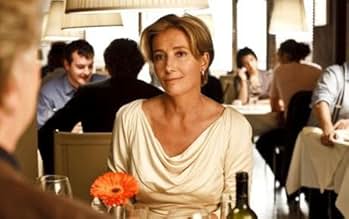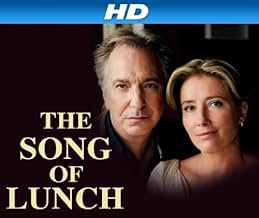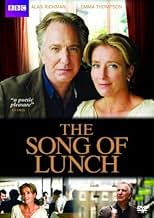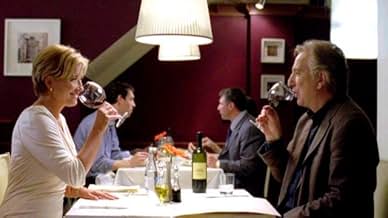The Song of Lunch
- टीवी फ़िल्म
- 2010
- 50 मि
IMDb रेटिंग
7.3/10
2.7 हज़ार
आपकी रेटिंग
अपनी भाषा में प्लॉट जोड़ेंA London publisher recounts a lunchtime reunion with a former lover, in poetic monologue.A London publisher recounts a lunchtime reunion with a former lover, in poetic monologue.A London publisher recounts a lunchtime reunion with a former lover, in poetic monologue.
- निर्देशक
- लेखक
- स्टार
- 1 प्राइमटाइम एमी के लिए नामांकित
- 4 कुल नामांकन
Christian Wolf-La'Moy
- Advertising Guy Talking with Massimo
- (बिना क्रेडिट के)
फ़ीचर्ड समीक्षाएं
To all the Harry Potter nerds, Alan Rickman narrating for a whole 50 mins. In a film, what else do you need?
The song of Lunch is my recent find while browsing through the filmography of Emma Thompson. With run-time less than an hour, this TV movie is a poetic monologue of a struggling writer who's having a lunch date with his ex-lover. The whole movie shot from the POV of Rickman who's still obsessed with Thomson after all these years of their separation. Shot in an Italian restaurant on the streets of London where the two used to hang out while they were young, this drama clearly emphasizes on how the guy has remained stuck up to his long gone romantic venture while lady has moved on with her life and is there only for a formal reunion. The way he looks at her while drinking the wine and remembering the time they had together is a treat to watch.
If you like watching two people having random conversation, you will definitely like this.
The song of Lunch is my recent find while browsing through the filmography of Emma Thompson. With run-time less than an hour, this TV movie is a poetic monologue of a struggling writer who's having a lunch date with his ex-lover. The whole movie shot from the POV of Rickman who's still obsessed with Thomson after all these years of their separation. Shot in an Italian restaurant on the streets of London where the two used to hang out while they were young, this drama clearly emphasizes on how the guy has remained stuck up to his long gone romantic venture while lady has moved on with her life and is there only for a formal reunion. The way he looks at her while drinking the wine and remembering the time they had together is a treat to watch.
If you like watching two people having random conversation, you will definitely like this.
He came close to his fantasy, a renewal. But shortly let his mind take him down a trail of various sorts of negativity. He was on that line a bit, a line where he could have been witty and upbeat and challenging, a line he crossed into torpor and, well, annoyance, and more.
Or perhaps He knew something the other reviewers here (and they are a very solid group of reviewers) did not know: That She too wanted a renewal. Though her words bely that possibility, well into the film, she touches his hand in a way that is personal and perhaps a bit erotic. Perhaps in her wonderful life with a successful author and two nondescript kids, she would like to recoup her past with He.
Perhaps He knew this, and sabotaged it. If so, Why?
The subject that screenwriters love to chat about, subtext, comes up. I thought the Mamet fiasco, PHIL SPECTOR, had the characters all delivering subtext as dialogue. Thus there was no mystery. Here, however, the subtext was given us in his unspoken words, his thoughts, as voice-over dialogue in his own head. Perambulating in his skull. It worked.
For Rickman, I find this his second most compelling work, the first being CLOSET LAND (which I saw on a Saturday night in a popular movie theater, but only me in the room for that film). Both works exploit his rich voice.
Or perhaps He knew something the other reviewers here (and they are a very solid group of reviewers) did not know: That She too wanted a renewal. Though her words bely that possibility, well into the film, she touches his hand in a way that is personal and perhaps a bit erotic. Perhaps in her wonderful life with a successful author and two nondescript kids, she would like to recoup her past with He.
Perhaps He knew this, and sabotaged it. If so, Why?
The subject that screenwriters love to chat about, subtext, comes up. I thought the Mamet fiasco, PHIL SPECTOR, had the characters all delivering subtext as dialogue. Thus there was no mystery. Here, however, the subtext was given us in his unspoken words, his thoughts, as voice-over dialogue in his own head. Perambulating in his skull. It worked.
For Rickman, I find this his second most compelling work, the first being CLOSET LAND (which I saw on a Saturday night in a popular movie theater, but only me in the room for that film). Both works exploit his rich voice.
Alan Rickman plays a jaded publisher meeting a past flame (Emma Thompson) at an old haunt, now impersonally renovated. The publisher has a one-track mind and views her every move as erotic.
This is a dramatised narrative poem. I'm sceptical about modern poetry but this one's quite good. It may be familiar ground but a lot of the phrases are actually quite good: consciously poetic but a concise description. Fans of Alan Rickman might find it hard to control himself as his character is aroused by everything: a squeezed hand, a glass of wine meeting his lips, a comely waitress, even a pepper shaker. The story is told through his perspective, much of it as voice-over. The switch between voice-over and dialogue really works, creating tension and drama in what is a fairly undramatic scene. It's like a short play.
Both Rickman and Thompson speak the blank verse (with the occasional rhyme) very naturally. Their characters are intellectual people and the talk comes naturally to them, particularly Rickman's emotionally/creatively/sexually frustrated character.
It's only 50 minutes so it's worth a watch. It would have been nice if it were part of a series of poems.
This is a dramatised narrative poem. I'm sceptical about modern poetry but this one's quite good. It may be familiar ground but a lot of the phrases are actually quite good: consciously poetic but a concise description. Fans of Alan Rickman might find it hard to control himself as his character is aroused by everything: a squeezed hand, a glass of wine meeting his lips, a comely waitress, even a pepper shaker. The story is told through his perspective, much of it as voice-over. The switch between voice-over and dialogue really works, creating tension and drama in what is a fairly undramatic scene. It's like a short play.
Both Rickman and Thompson speak the blank verse (with the occasional rhyme) very naturally. Their characters are intellectual people and the talk comes naturally to them, particularly Rickman's emotionally/creatively/sexually frustrated character.
It's only 50 minutes so it's worth a watch. It would have been nice if it were part of a series of poems.
This film is not going to be for everyone. I knew that just five minutes in. But I loved it. The poem, the dialogue, the acting. Any lesser actors than these two could not have pulled it off. It is heartbreaking, because fairly early in, it becomes clear that someone has a problem and it is this issue, along with other feelings of inadequacy that is the true root of their relationship's demise. What is especially interesting is the fact that the viewer doesn't despise Rickman's character--rather, feels his humiliation and loss.
I gave the film eight stars rather than 10, because unresolved for me is the "WHY" of it. Why does he ask her to meet him for lunch to begin with? Is it to punish her? To rekindle something? Is the scene outside the apartment in Paris meant to illustrate obsession? Why does she agree to meet? Is she just being kind? If so--then why is she so cruel in her assessment of his book? The motivation/impetus for this lunch feels unclear to me.
I gave the film eight stars rather than 10, because unresolved for me is the "WHY" of it. Why does he ask her to meet him for lunch to begin with? Is it to punish her? To rekindle something? Is the scene outside the apartment in Paris meant to illustrate obsession? Why does she agree to meet? Is she just being kind? If so--then why is she so cruel in her assessment of his book? The motivation/impetus for this lunch feels unclear to me.
This is the worst thing I've seen since My Dinner with Andre over thirty years ago. It's worse than Hook, worse than Australia, worse than the worst action movie I used to take my teenage son to see to humor him.
Is he supposed to be unlikable, or merely a bore?
What could she have possibly ever seen in him?
Who cares about his "poetry"?
The lines are unbearable, not to mention childishly vulgar, when not being unintentionally laughable.
Is this what "art" has become, ridiculously pretentious, lacking in content, causing one to itch with utter boredom?
Is he supposed to be unlikable, or merely a bore?
What could she have possibly ever seen in him?
Who cares about his "poetry"?
The lines are unbearable, not to mention childishly vulgar, when not being unintentionally laughable.
Is this what "art" has become, ridiculously pretentious, lacking in content, causing one to itch with utter boredom?
क्या आपको पता है
- ट्रिवियाThe photo on the dust jacket of the lead female character's husband's book is one of Greg Wise, Dame Emma Thompson's real-life husband.
- कनेक्शनFeatured in The Wright Stuff: एपिसोड #14.45 (2010)
टॉप पसंद
रेटिंग देने के लिए साइन-इन करें और वैयक्तिकृत सुझावों के लिए वॉचलिस्ट करें
विवरण
इस पेज में योगदान दें
किसी बदलाव का सुझाव दें या अनुपलब्ध कॉन्टेंट जोड़ें




























